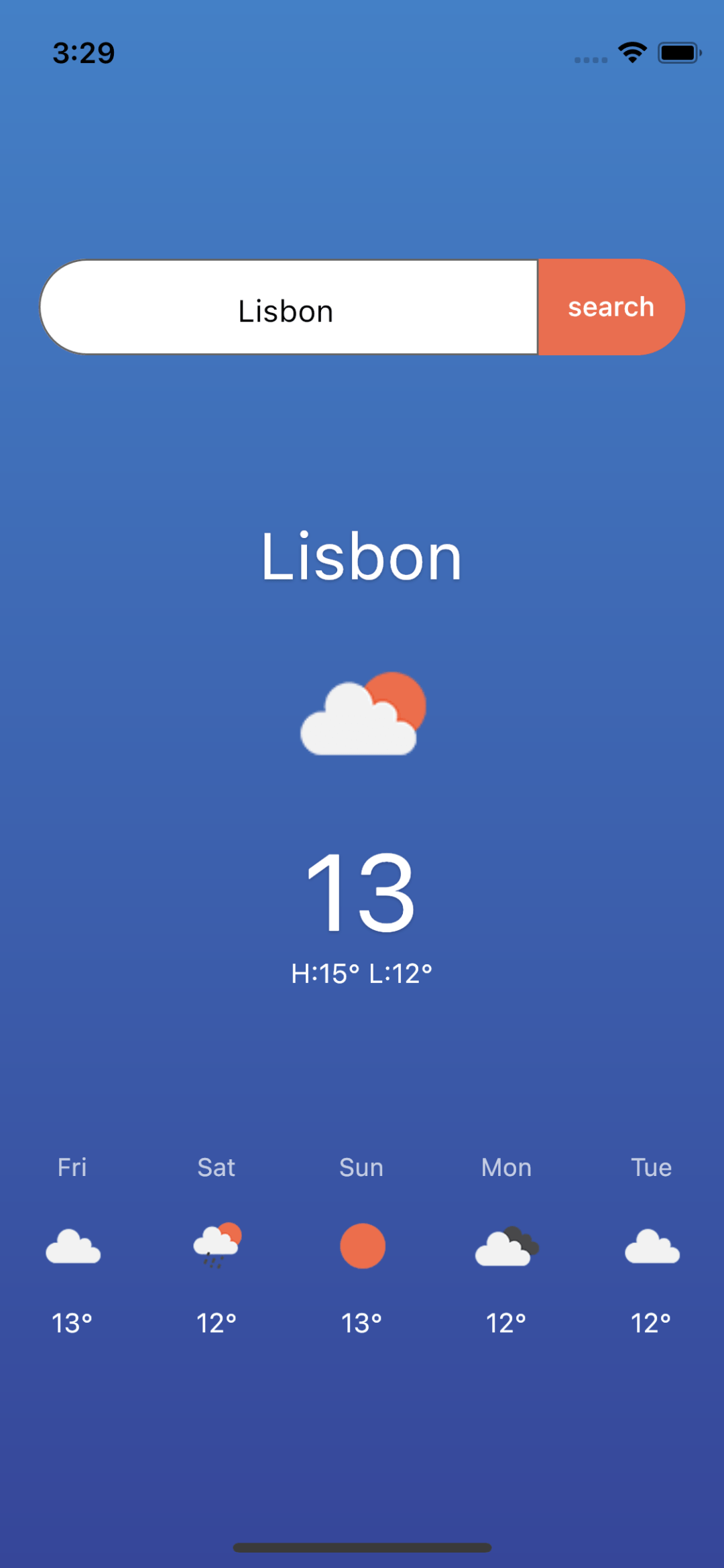https://github.com/bizz84/open_weather_example_flutter
Flutter Weather App Example using the OpenWeatherMap API
https://github.com/bizz84/open_weather_example_flutter
app-architecture flutter rest-api
Last synced: 7 months ago
JSON representation
Flutter Weather App Example using the OpenWeatherMap API
- Host: GitHub
- URL: https://github.com/bizz84/open_weather_example_flutter
- Owner: bizz84
- License: mit
- Created: 2022-01-13T14:24:59.000Z (almost 4 years ago)
- Default Branch: main
- Last Pushed: 2024-04-19T02:52:07.000Z (over 1 year ago)
- Last Synced: 2025-03-30T03:07:29.150Z (8 months ago)
- Topics: app-architecture, flutter, rest-api
- Language: Dart
- Homepage: https://codewithandrea.com/
- Size: 315 KB
- Stars: 302
- Watchers: 5
- Forks: 77
- Open Issues: 2
-
Metadata Files:
- Readme: README.md
- License: LICENSE.md
Awesome Lists containing this project
README
# Flutter Weather App Example
An example Flutter weather app using the [OpenWeatherMap API](https://openweathermap.org/api).

## Related Tutorials
- [Flutter App Architecture: The Repository Pattern](https://codewithandrea.com/articles/flutter-repository-pattern/)
## Supported Features
- [x] Current weather (condition and temperature)
- [x] 5-day weather forecast
- [x] Search by city
## App Architecture
The app is composed by three main layers.
### Data Layer
The data layer contains a single `HttpWeatherRepository` that is used to fetch weather data from the [OpenWeatherMap API](https://openweathermap.org/api).
The data is then parsed (using Freezed) and returned using **type-safe** entity classes (`Weather` and `Forecast`).
For more info about this, read this tutorial:
- [Flutter App Architecture: The Repository Pattern](https://codewithandrea.com/articles/flutter-repository-pattern/)
For more info about the project structure, read this:
- [Flutter Project Structure: Feature-first or Layer-first?](https://codewithandrea.com/articles/flutter-project-structure/)
### Application Layer
This contains some providers that are used to fetch and cache the data from the `HttpWeatherRepository`.
```dart
// current city stored in the search box in the UI
final cityProvider = StateProvider((ref) {
return 'London';
});
// provider to fetch the current weather
final currentWeatherProvider =
FutureProvider.autoDispose((ref) async {
final city = ref.watch(cityProvider);
final weather =
await ref.watch(weatherRepositoryProvider).getWeather(city: city);
return WeatherData.from(weather);
});
// provider to fetch the hourly weather
final hourlyWeatherProvider =
FutureProvider.autoDispose((ref) async {
final city = ref.watch(cityProvider);
final forecast =
await ref.watch(weatherRepositoryProvider).getForecast(city: city);
return ForecastData.from(forecast);
});
```
### Presentation Layer
This layer holds all the widgets, which fetch the data from the `FutureProvider`s above and map the resulting `AsyncValue` objects to the appropriate UI states (data, loading, error).
## Packages in use
- [riverpod](https://pub.dev/packages/riverpod) for state management
- [freezed](https://pub.dev/packages/freezed) for code generation
- [http](https://pub.dev/packages/http) for talking to the REST API
- [cached_network_image](https://pub.dev/packages/cached_network_image) for caching images
- [mocktail](https://pub.dev/packages/mocktail) for testing
## About the OpenStreetMap weather API
The app shows data from the following endpoints:
- [Current Weather Data](https://openweathermap.org/current)
- [Weather Fields in API Response](https://openweathermap.org/current#parameter)
- [5 day weather forecast](https://openweathermap.org/forecast5)
- [Weather Conditions](https://openweathermap.org/weather-conditions)
**Note**: to use the API you'll need to register an account and obtain your own API key. This can be set via `--dart-define` or inside `lib/src/api/api_keys.dart`.
### [LICENSE: MIT](LICENSE.md)